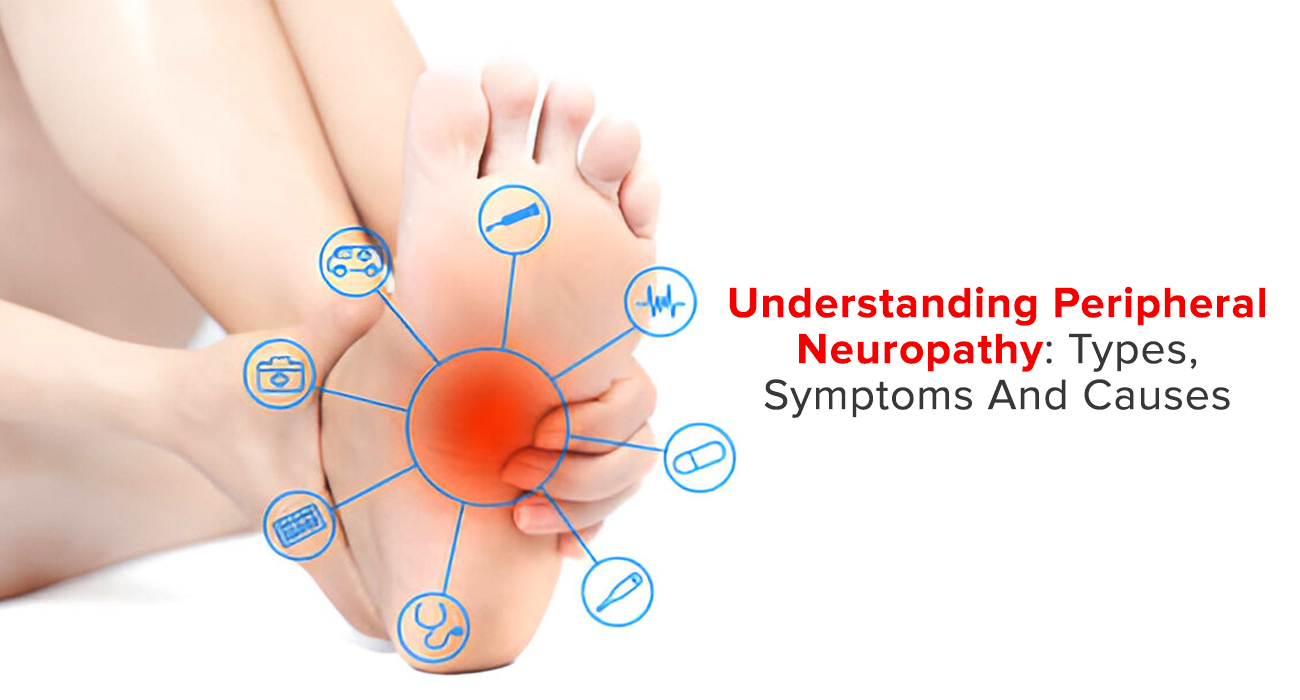
Peripheral neuropathy is a disease that occurs when the peripheral nerves, which link the brain and spinal cord to the rest of the body, are damaged. This can impair communication between the central nervous system and the periphery, and thus causes many kinds of sensory, motor, and autonomic disturbances.
In this overview, we will see the various kinds of peripheral neuropathy, how common causes, such as diabetes, infections, and trauma are involved, analyze symptoms from numbness and pain to muscle weakness, and go over the range of treatment available in medications, lifestyle changes, and therapies. The better this condition is known, the easier it is for patients to realize and manage their situation.
Types of Peripheral Neuropathy
Peripheral neuropathy can be classified into different types based on the affected nerve types and the underlying cause. These include:
Sensory Neuropathy: This type affects the sensory nerves, leading to symptoms such as numbness, tingling, burning, or sharp pain, particularly in the hands and feet. It may cause difficulty in detecting temperature or touch, increasing the risk of injuries.
Motor Neuropathy Motor neuropathy occurs in the motor nerves that convey impulses to carry out muscle contractions. A person may face weakness, spasms, tremors, or even atrophy of muscles with severe involvement. Fine motor work becomes difficult.
Autonomic Neuropathy: The disease disrupts automatic functions of the body, like heart rate and blood pressure regulation, digestion, and bladder control, when it affects the autonomic nerves. Dizziness when standing, sweating disorders, and gastrointestinal disorders are also common symptoms.
Focal Neuropathy: Focal neuropathy, or mononeuropathy, is a nerve damage involving the impairment of one nerve or several nerves. Pain or weakness often occurs in one specific area such as the wrist, hand, or face. Carpal tunnel syndrome is among the common causes of focal neuropathy.
Polyneuropathy: This is the most common form of peripheral neuropathy and affects multiple peripheral nerves at once. Diabetes is the most common cause, resulting in symptoms that typically follow a “glove and stocking” distribution, beginning in the hands and feet.
Proximal Neuropathy: Also referred to as diabetic amyotrophy, this is a rare type of neuropathy primarily affecting the thighs, hips, or buttocks, which leads to extreme pain and muscle weakness. This type of neuropathy is mostly found in people suffering from type 2 diabetes.
What Causes Peripheral Neuropathy?
Peripheral neuropathy may be caused by a variety of underlying diseases, environmental exposures, or even genetic predispositions. Some common causes include the following:
Diabetes Mellitus is the most common cause of peripheral neuropathy; it is more common in the form of diabetic neuropathy. High glucose level in blood can damage the nerves and blood vessels that supply them due to which symptoms occur, mainly feeling and motor disturbance.
Physical Trauma or Injury: Trauma to the body following an accident, fracture, or repetitive stress injury-for example, carpal tunnel syndrome-can cause peripheral nerves to become compressed or severed, resulting in neuropathy localized to the site of injury.
Infections: Examples of infections causing damage to peripheral nerves include shingles, caused by the varicella-zoster virus, HIV/AIDS, hepatitis C, and Lyme disease.
Autoimmune Disorders: Conditions such as lupus, rheumatoid arthritis, or Guillain-Barré syndrome cause inflammation and damage to nerves, which can result in neuropathy.
Alcoholism: Chronic alcohol abuse leads to deficiencies in many nutrients, including B vitamins that are important to the health of nerves, causing alcoholic neuropathy.
Nutritional Deficiency: Deficient levels of a few nutrients-the B1 also known as thiamine B6 also known as pyridoxine B12 cobalamin and E-can affect peripheral nerve function
Exposure to Toxins: Longterm exposure to noxious agents-heavy metals such as lead and mercury industrial chemicals as well as chemotherapeutic drugs can damage nerves.
Inherited Disorders: Inherited disorders, such as Charcot-Marie-Tooth disease, can lead to progressive nerve damage and symptoms of neuropathy.
Metabolic and Endocrine Disorders: Metabolic conditions, including hypothyroidism and chronic kidney disease, can cause progressive nerve damage.


